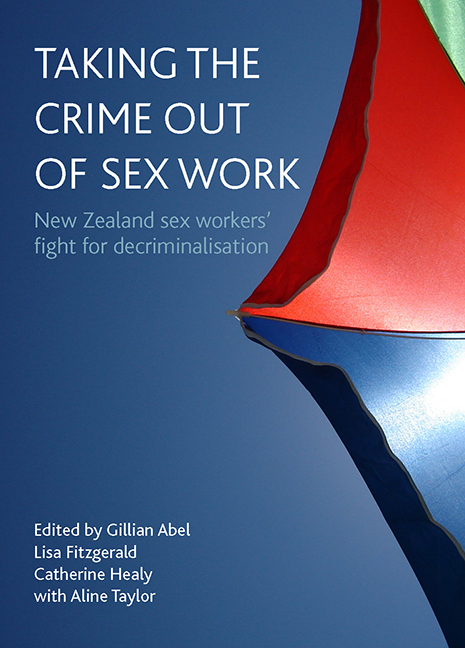Book contents
- Frontmatter
- Contents
- List of tables and figures
- Notes on contributors
- Acknowledgements
- one Introduction
- Part One Lead-up to the passing of the 2003 Prostitution Reform Act
- Part Two Implementation and impact of the 2003 Prostitution Reform Act: the first five years
- Index
- Also available from The Policy Press
one - Introduction
Published online by Cambridge University Press: 01 September 2022
- Frontmatter
- Contents
- List of tables and figures
- Notes on contributors
- Acknowledgements
- one Introduction
- Part One Lead-up to the passing of the 2003 Prostitution Reform Act
- Part Two Implementation and impact of the 2003 Prostitution Reform Act: the first five years
- Index
- Also available from The Policy Press
Summary
Prior to 2003, although sex work in New Zealand was not illegal, all associated activities, such as soliciting, brothel keeping, living on the earnings of prostitution and procuring, were criminalised. This created an environment in which violence, exploitation and coercion could flourish (Lowman, 2000; WHO, 2005). Sustained social action over nearly two decades, which involved advocacy and lobbying by the New Zealand Prostitutes’ Collective (NZPC), politicians across the political spectrum, women's rights activists, academics and other volunteers, was effective in bringing about legislative change. In June 2003, New Zealand became the first country to decriminalise sex work when the 2003 Prostitution Reform Act (PRA) was voted on and passed by a majority of one vote in Parliament. This legislative approach differs to other international approaches as it represents a shift from regulating sex work from a moral perspective to acknowledging the human rights of this section of the population. Decriminalisation meant that prostitution was acknowledged as service work and sex workers in New Zealand were able to operate under the same employment and legal rights accorded to any other occupational group.
The particular historical, social and cultural context within New Zealand was influential in legislating for the decriminalisation of sex work. New Zealand is a young society and has less strict gendered, class and ethnic social structures than countries such as the United Kingdom. The dominant political ideology of New Zealand from the days of early colonisation has been liberalism and this has shaped the laws of this country (Duncan, 2007). New Zealand women in the 19th century had more freedom socially and physically and, in 1893, were the first to be enfranchised. New Zealand was also at the forefront of a raft of other social reforms such as the 1898 Old Age Pensions Act, which led some commentators to state that New Zealand was the ‘sociological experiment station of the world’ (Le Rossignol and Stewart, 1910, cited in Duncan, 2007, p 18). The principles of liberalism, such as respect for diversity, freedom of choice and human rights, continue to dominate the policy environment in New Zealand in the 21st century.
- Type
- Chapter
- Information
- Taking the Crime out of Sex WorkNew Zealand Sex Workers' Fight for Decriminalisation, pp. 1 - 22Publisher: Bristol University PressPrint publication year: 2010



